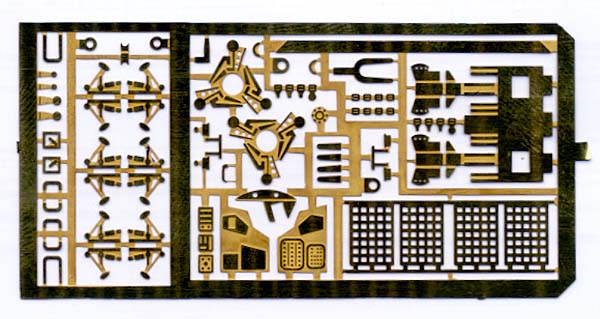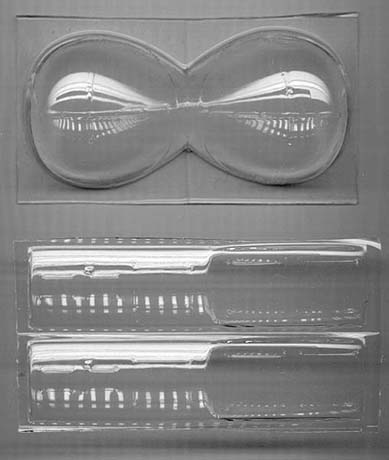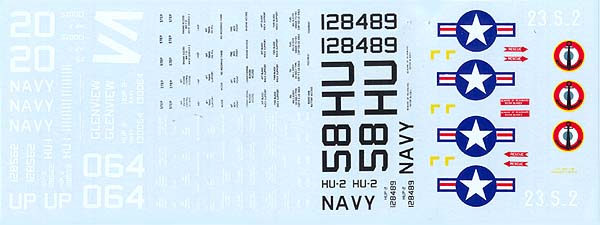|

Battle
Axe's 1/48 scale HUP-2 Retriever
isavailable online from Squadron.com
S
u m m a r y
|
| Catalogue Number: |
BX4806 |
| Scale: |
1/48 |
| Contents and Media: |
51 parts injection-moulded in white
plastic, 66 brass-etch parts and six vacform parts. |
| Price: |
US$49.96 from
Squadron.com |
| Review Type: |
FirstLook |
| Advantages: |
Ambitious and unique subject matter;
fairly sharp detail; good photo-etched parts; thoughtful engineering for
vacform nose; helpful instructions in English |
| Disadvantages: |
Flash present on plastic parts; vac
nose will need care; raised pips on vac parts; US Insignia Blue too pale. |
| Recommendation: |
Recommended |
Reviewed by Rodger Kelly
Battle Axe is a French company which produces limited
run kits of subjects that are unlikely to ever be released by mainstream
modelling companies.
Like the other well known French company, Fonderie Miniature, Battle Axe
focus their production efforts on producing models of aircraft that were
flown by the French Armed Forces.
Battle Axe’s latest release, the HUP-2, is no exception.
The HUP-2 “Retriever”
The Piasecki Helicopter Corporation HUP-2 was another of the
second-generation rotary-wing designs that first appeared in service in
the early ‘50s. The HUP-2 was used by the US Navy and US Army as well as
the armed forces of France and Canada. But enough of the history lesson
and on with the kit!
As stated previously, this is a limited run kit and
as such is a product of the limited run process. What does that mean?
Well, to put it simply, it is not one of the highly engineered, stunningly
refined products that is available from Japan.
The kit comprises of 51 parts injection-moulded in white plastic, 66
brass-etch parts and six vacform parts.
Injection-Moulded Parts
The injection-moulded parts are contained on one enormous sprue. This
sprue is so large that I had to cut it in half just to fit on the bed of
my scanner! Again, the parts are the result of the short-run manufacturing
process. All of them contain flash to some degree, but nothing that is all
that serious. The plastic is relatively soft so the clean-up process will
not be too onerous. The detail on the parts is sharp enough so that you
know where the flash ends and the part begins.
Click the
thumbnails below to view larger images:
Brass-Etch Parts
The brass-etch sheet is quite comprehensive and the parts exhibit
two-dimensional relief, which will make them look nice under a coat of
paint.

The brass is very malleable and accepts the bending
process quite well.
Vacform Parts
Oh dear, that word! The vacform parts are for the forward part of the
fuselage cum windscreen and the various windows in the fuselage. The parts
are beautifully clear and are formed so that they incorporate part of the
surrounding fuselage.

This is a great idea and means that you have some
plastic between what needs to remain clear and what you can sand and
putty. There are prominent moulding pips present on the windscreen but
these are confined to the framework and should not present too much of a
challenge to remove. Thankfully, two of each part is provided in case of
slip-ups.
Decals
The decal sheet is quite comprehensive and provides markings for four
different machines that pretty well represent the service history of
HUP-2.
-
An overall Glossy Sea Blue
machine of Naval Air Station Glenview with an International Orange band
around the rear fuselage.
-
An overall Glossy Sea Blue
machine of HU-1 that sports liberal applications of Insignia Red on the
tops and bottoms of the fuselage as well as the entire rudder.
-
An overall Glossy Sea Blue
machine of the French Navy
-
An overall Light Gull Grey
machine of HU-1.
Surprisingly, there is no
Canadian option.
Each of the options is complete and fully supplemented by an extensive
selection of stencil data.

Unfortunately, I am not able to comment on the
opacity of the decals, as I have not yet subjected them to the test. My
only concern with the decals as presented is that the blue of the US
National Insignia is far too light.
Instruction Sheet
The instruction sheet is quite comprehensive and
printed (in English) on both sides of an A-4 sheet.
Click the
thumbnails below to view larger images:
As well as providing excellent, easily understood
construction notes, drawings of the assembly sequence and helpful
suggestions it also provides:
-
A placement diagram for the
myriad of stencil data, and
-
A full and detailed
painting guide quoting Federal Standard paint numbers.
Packaging
Interesting to say the least!
The whole kit is contained within in a plastic
zip-loc bag with a cardboard header. The brass-etch sheet is packed into
another smaller ziploc bag that also contains the vacform parts. The main
fuselage parts are at the top and bottom of the sprue and form the edges
of it (see the images).
However, having suggested that the packaging is
inadequate, I do have to say that my example has arrived here safely in
Perth, Western Australia after having been subjected to the postal system
twice. Firstly, from the USA to Sydney, Australia and hence from Sydney to
Perth.
Again, I have to confess that I have only dry-fitted,
Blue-tacked and taped the interior parts and fuselage halves together but
they all went together quite easily with only perfunctory attention with
sandpaper and files.
Battle Axe’s 1/48 scale HUP-2 is not really for the
feint-hearted but it is all there. The kit simply needs the application of
time and basic modelling skills to do it justice. Whilst references do not
abound they can be found. The Delaware Valley Historical Aircraft
Association
http://www.dvhaa.org/hup-2.html has some nice pictures of their HUP-2
whilst it was being restored that will help providing images to aid in
detailing, as well as providing links to other sites that contain info on
the HUP-2, one of them being a Russian site
http://avia.russian.ee/vertigo/piasecki_hup-r.html that has a history
of the machine.
Recommended
Thanks to
Squadron.com for the review
sample.
Review and Images Copyright © 2001 by
Rodger Kelly
Page Created 03 May, 2002
Last updated 09 November, 2003
Back to HyperScale Main Page
Back to Reviews Page
|
Home | What's
New | Features
| Gallery |
Reviews | Reference
| Forum
| Search